Organizational Behaviour Analysis: Shell Plc, MBA Module Report
VerifiedAdded on 2023/06/09
|13
|4065
|169
Report
AI Summary
This report provides a comprehensive analysis of organizational behavior within Shell Plc. It begins by examining the influence of organizational culture, politics, and power dynamics on individual and team behavior and performance. The report then evaluates content and process theories of motivation, including Maslow's Hierarchy of Needs, Herzberg's theory, equity theory, and goal-setting theory, along with motivational techniques, to assess their impact on goal achievement. A reflective statement compares effective and ineffective teams, highlighting key characteristics and their impact on organizational performance. The report also applies concepts and philosophies of organizational behavior within the context of Shell Plc. Throughout the analysis, relevant examples are used to illustrate the application of these concepts within the organization. The report concludes with a synthesis of the findings and recommendations for improving organizational effectiveness.
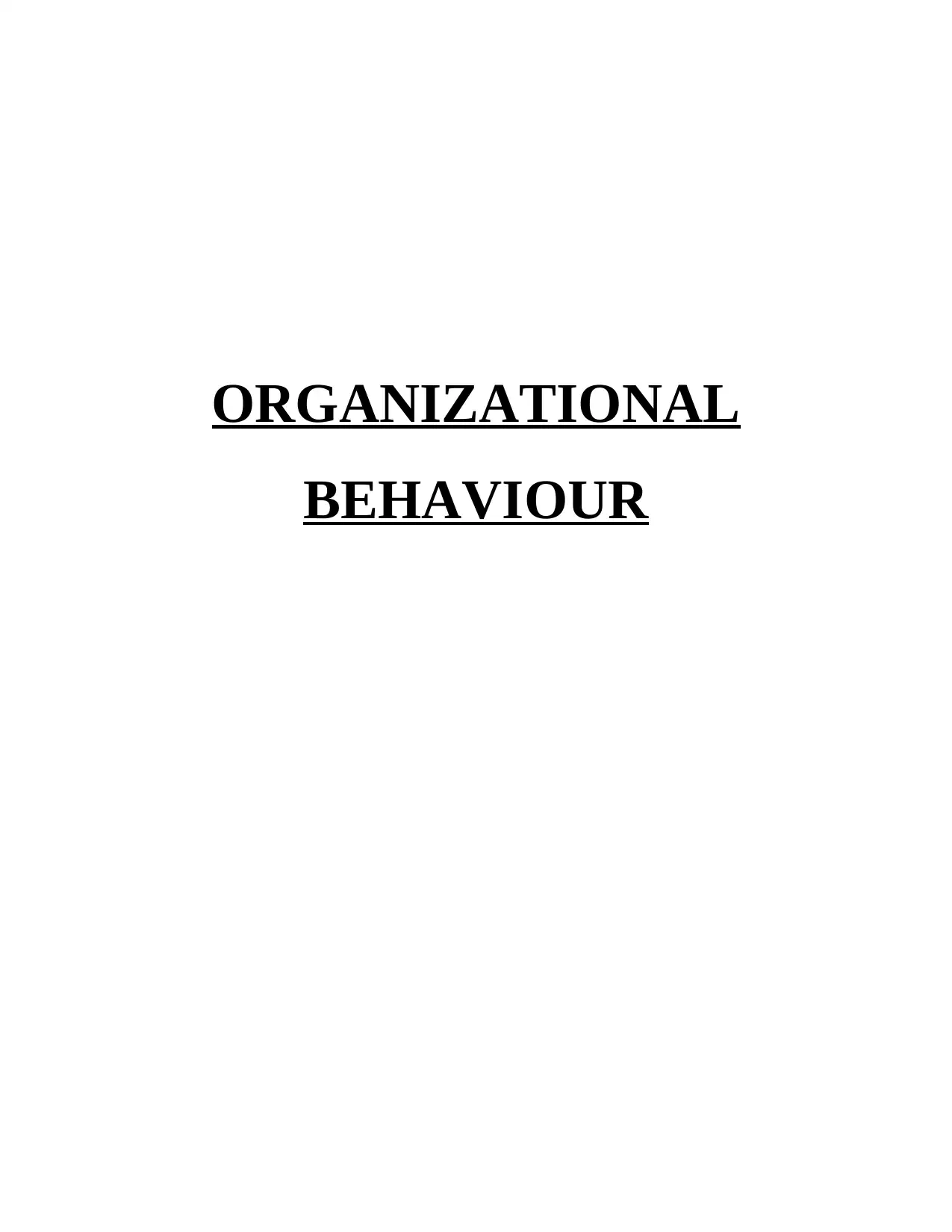
ORGANIZATIONAL
BEHAVIOUR
BEHAVIOUR
Paraphrase This Document
Need a fresh take? Get an instant paraphrase of this document with our AI Paraphraser
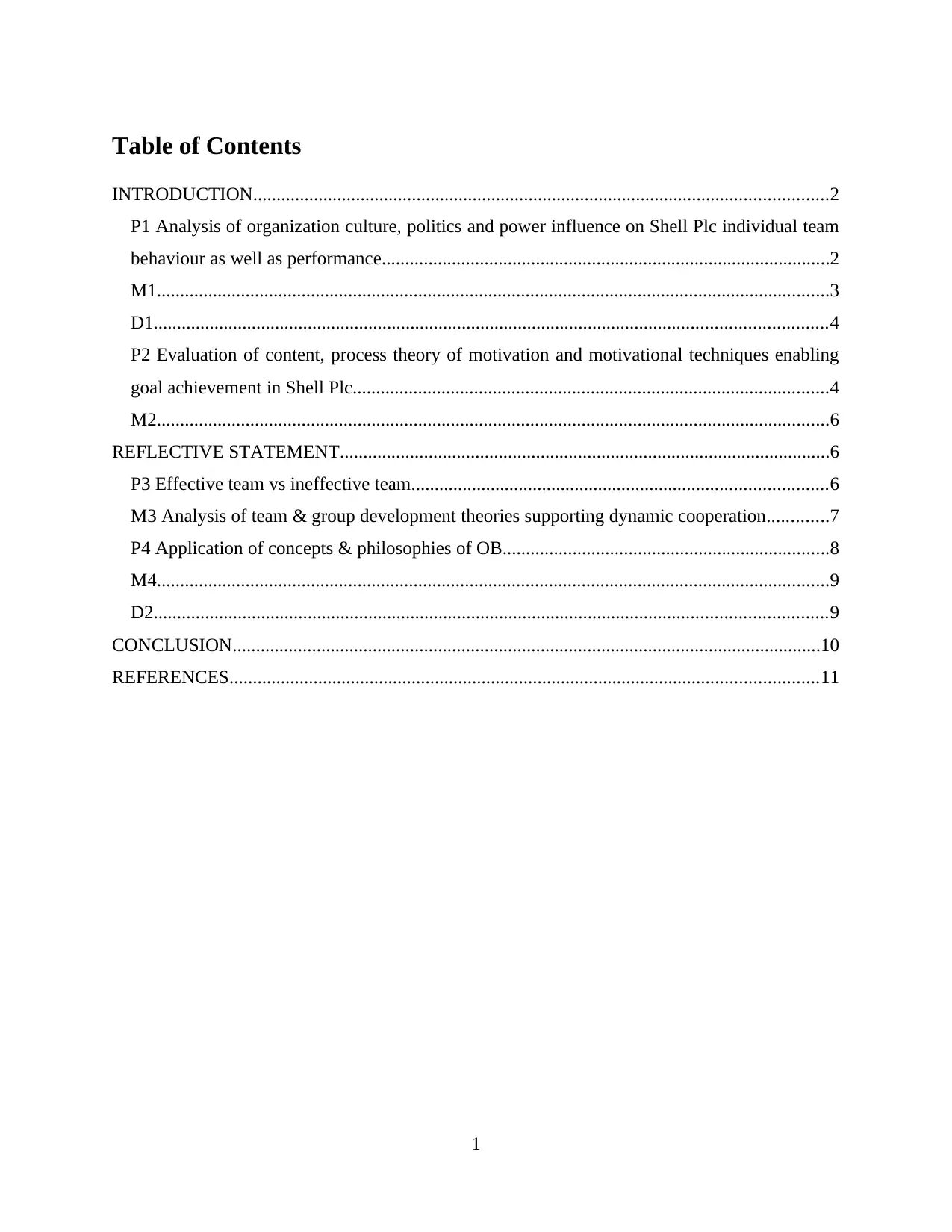
Table of Contents
INTRODUCTION...........................................................................................................................2
P1 Analysis of organization culture, politics and power influence on Shell Plc individual team
behaviour as well as performance................................................................................................2
M1................................................................................................................................................3
D1................................................................................................................................................4
P2 Evaluation of content, process theory of motivation and motivational techniques enabling
goal achievement in Shell Plc......................................................................................................4
M2................................................................................................................................................6
REFLECTIVE STATEMENT.........................................................................................................6
P3 Effective team vs ineffective team.........................................................................................6
M3 Analysis of team & group development theories supporting dynamic cooperation.............7
P4 Application of concepts & philosophies of OB......................................................................8
M4................................................................................................................................................9
D2................................................................................................................................................9
CONCLUSION..............................................................................................................................10
REFERENCES..............................................................................................................................11
1
INTRODUCTION...........................................................................................................................2
P1 Analysis of organization culture, politics and power influence on Shell Plc individual team
behaviour as well as performance................................................................................................2
M1................................................................................................................................................3
D1................................................................................................................................................4
P2 Evaluation of content, process theory of motivation and motivational techniques enabling
goal achievement in Shell Plc......................................................................................................4
M2................................................................................................................................................6
REFLECTIVE STATEMENT.........................................................................................................6
P3 Effective team vs ineffective team.........................................................................................6
M3 Analysis of team & group development theories supporting dynamic cooperation.............7
P4 Application of concepts & philosophies of OB......................................................................8
M4................................................................................................................................................9
D2................................................................................................................................................9
CONCLUSION..............................................................................................................................10
REFERENCES..............................................................................................................................11
1
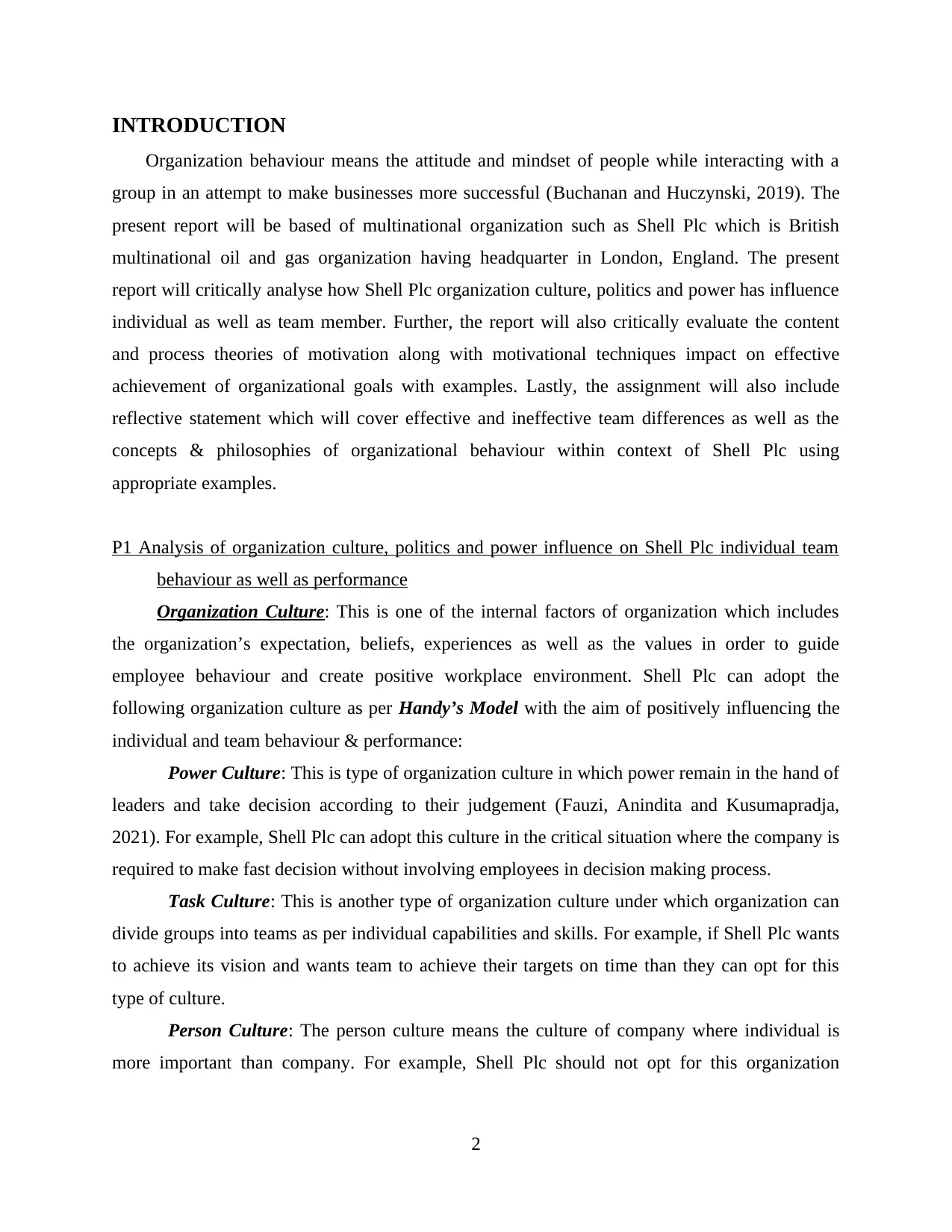
INTRODUCTION
Organization behaviour means the attitude and mindset of people while interacting with a
group in an attempt to make businesses more successful (Buchanan and Huczynski, 2019). The
present report will be based of multinational organization such as Shell Plc which is British
multinational oil and gas organization having headquarter in London, England. The present
report will critically analyse how Shell Plc organization culture, politics and power has influence
individual as well as team member. Further, the report will also critically evaluate the content
and process theories of motivation along with motivational techniques impact on effective
achievement of organizational goals with examples. Lastly, the assignment will also include
reflective statement which will cover effective and ineffective team differences as well as the
concepts & philosophies of organizational behaviour within context of Shell Plc using
appropriate examples.
P1 Analysis of organization culture, politics and power influence on Shell Plc individual team
behaviour as well as performance
Organization Culture: This is one of the internal factors of organization which includes
the organization’s expectation, beliefs, experiences as well as the values in order to guide
employee behaviour and create positive workplace environment. Shell Plc can adopt the
following organization culture as per Handy’s Model with the aim of positively influencing the
individual and team behaviour & performance:
Power Culture: This is type of organization culture in which power remain in the hand of
leaders and take decision according to their judgement (Fauzi, Anindita and Kusumapradja,
2021). For example, Shell Plc can adopt this culture in the critical situation where the company is
required to make fast decision without involving employees in decision making process.
Task Culture: This is another type of organization culture under which organization can
divide groups into teams as per individual capabilities and skills. For example, if Shell Plc wants
to achieve its vision and wants team to achieve their targets on time than they can opt for this
type of culture.
Person Culture: The person culture means the culture of company where individual is
more important than company. For example, Shell Plc should not opt for this organization
2
Organization behaviour means the attitude and mindset of people while interacting with a
group in an attempt to make businesses more successful (Buchanan and Huczynski, 2019). The
present report will be based of multinational organization such as Shell Plc which is British
multinational oil and gas organization having headquarter in London, England. The present
report will critically analyse how Shell Plc organization culture, politics and power has influence
individual as well as team member. Further, the report will also critically evaluate the content
and process theories of motivation along with motivational techniques impact on effective
achievement of organizational goals with examples. Lastly, the assignment will also include
reflective statement which will cover effective and ineffective team differences as well as the
concepts & philosophies of organizational behaviour within context of Shell Plc using
appropriate examples.
P1 Analysis of organization culture, politics and power influence on Shell Plc individual team
behaviour as well as performance
Organization Culture: This is one of the internal factors of organization which includes
the organization’s expectation, beliefs, experiences as well as the values in order to guide
employee behaviour and create positive workplace environment. Shell Plc can adopt the
following organization culture as per Handy’s Model with the aim of positively influencing the
individual and team behaviour & performance:
Power Culture: This is type of organization culture in which power remain in the hand of
leaders and take decision according to their judgement (Fauzi, Anindita and Kusumapradja,
2021). For example, Shell Plc can adopt this culture in the critical situation where the company is
required to make fast decision without involving employees in decision making process.
Task Culture: This is another type of organization culture under which organization can
divide groups into teams as per individual capabilities and skills. For example, if Shell Plc wants
to achieve its vision and wants team to achieve their targets on time than they can opt for this
type of culture.
Person Culture: The person culture means the culture of company where individual is
more important than company. For example, Shell Plc should not opt for this organization
2
⊘ This is a preview!⊘
Do you want full access?
Subscribe today to unlock all pages.

Trusted by 1+ million students worldwide
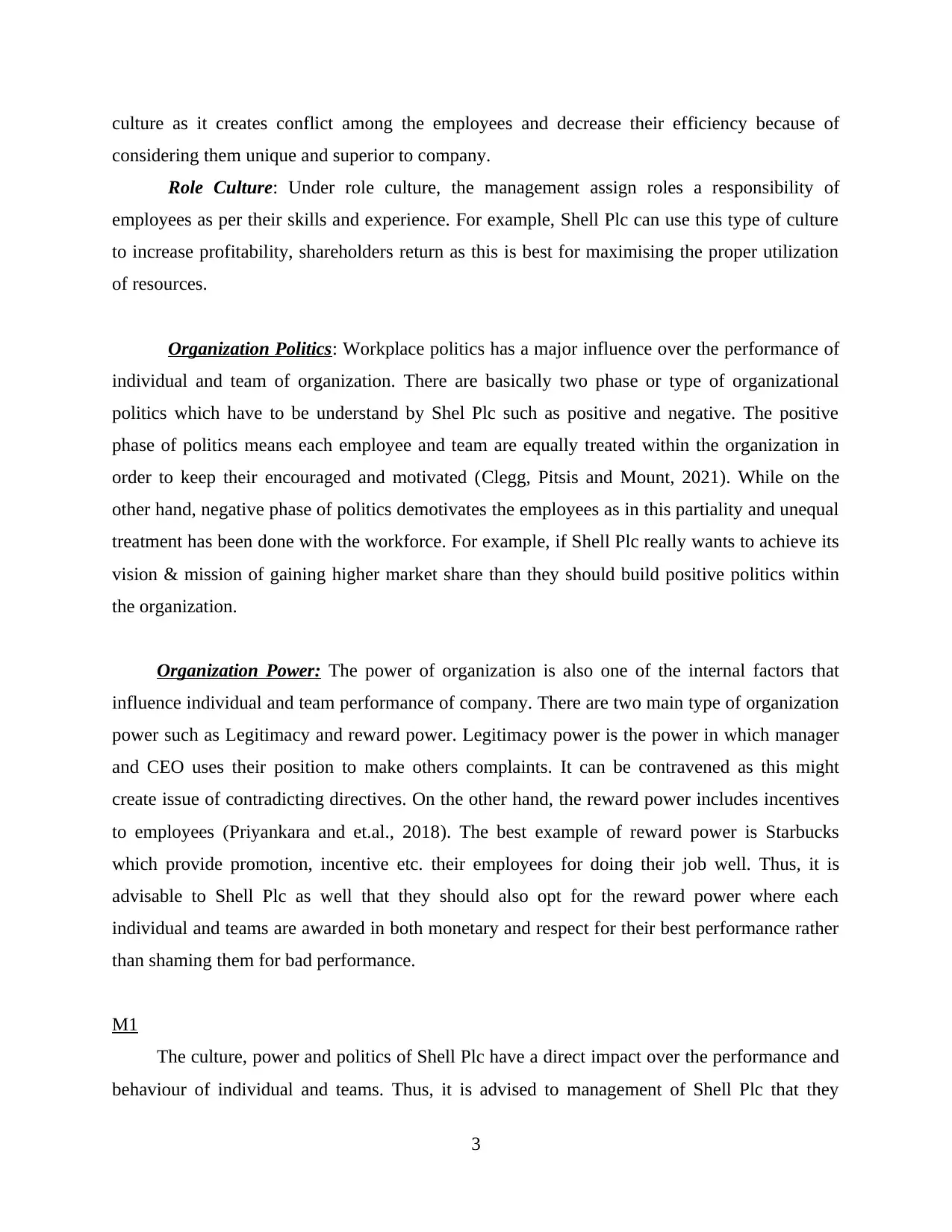
culture as it creates conflict among the employees and decrease their efficiency because of
considering them unique and superior to company.
Role Culture: Under role culture, the management assign roles a responsibility of
employees as per their skills and experience. For example, Shell Plc can use this type of culture
to increase profitability, shareholders return as this is best for maximising the proper utilization
of resources.
Organization Politics: Workplace politics has a major influence over the performance of
individual and team of organization. There are basically two phase or type of organizational
politics which have to be understand by Shel Plc such as positive and negative. The positive
phase of politics means each employee and team are equally treated within the organization in
order to keep their encouraged and motivated (Clegg, Pitsis and Mount, 2021). While on the
other hand, negative phase of politics demotivates the employees as in this partiality and unequal
treatment has been done with the workforce. For example, if Shell Plc really wants to achieve its
vision & mission of gaining higher market share than they should build positive politics within
the organization.
Organization Power: The power of organization is also one of the internal factors that
influence individual and team performance of company. There are two main type of organization
power such as Legitimacy and reward power. Legitimacy power is the power in which manager
and CEO uses their position to make others complaints. It can be contravened as this might
create issue of contradicting directives. On the other hand, the reward power includes incentives
to employees (Priyankara and et.al., 2018). The best example of reward power is Starbucks
which provide promotion, incentive etc. their employees for doing their job well. Thus, it is
advisable to Shell Plc as well that they should also opt for the reward power where each
individual and teams are awarded in both monetary and respect for their best performance rather
than shaming them for bad performance.
M1
The culture, power and politics of Shell Plc have a direct impact over the performance and
behaviour of individual and teams. Thus, it is advised to management of Shell Plc that they
3
considering them unique and superior to company.
Role Culture: Under role culture, the management assign roles a responsibility of
employees as per their skills and experience. For example, Shell Plc can use this type of culture
to increase profitability, shareholders return as this is best for maximising the proper utilization
of resources.
Organization Politics: Workplace politics has a major influence over the performance of
individual and team of organization. There are basically two phase or type of organizational
politics which have to be understand by Shel Plc such as positive and negative. The positive
phase of politics means each employee and team are equally treated within the organization in
order to keep their encouraged and motivated (Clegg, Pitsis and Mount, 2021). While on the
other hand, negative phase of politics demotivates the employees as in this partiality and unequal
treatment has been done with the workforce. For example, if Shell Plc really wants to achieve its
vision & mission of gaining higher market share than they should build positive politics within
the organization.
Organization Power: The power of organization is also one of the internal factors that
influence individual and team performance of company. There are two main type of organization
power such as Legitimacy and reward power. Legitimacy power is the power in which manager
and CEO uses their position to make others complaints. It can be contravened as this might
create issue of contradicting directives. On the other hand, the reward power includes incentives
to employees (Priyankara and et.al., 2018). The best example of reward power is Starbucks
which provide promotion, incentive etc. their employees for doing their job well. Thus, it is
advisable to Shell Plc as well that they should also opt for the reward power where each
individual and teams are awarded in both monetary and respect for their best performance rather
than shaming them for bad performance.
M1
The culture, power and politics of Shell Plc have a direct impact over the performance and
behaviour of individual and teams. Thus, it is advised to management of Shell Plc that they
3
Paraphrase This Document
Need a fresh take? Get an instant paraphrase of this document with our AI Paraphraser
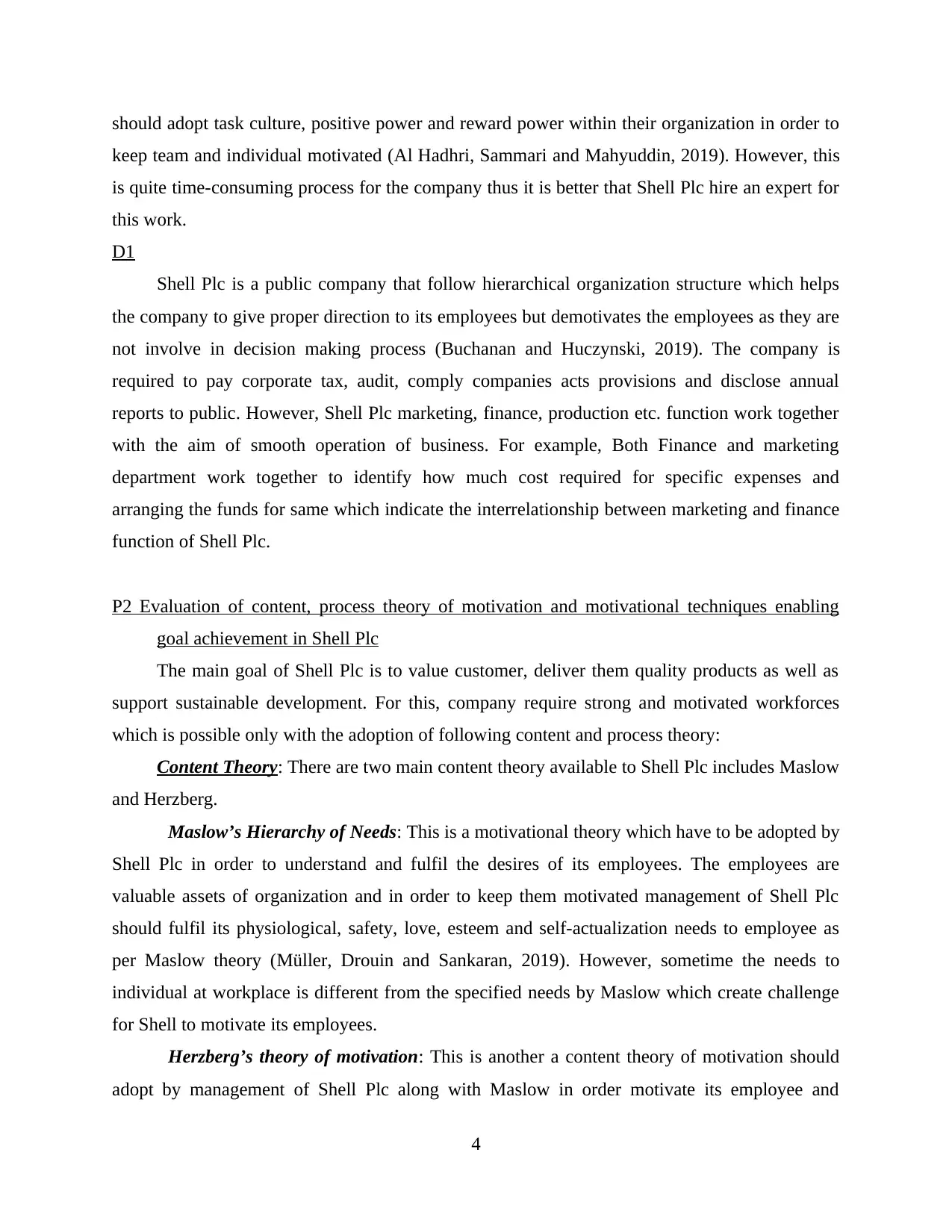
should adopt task culture, positive power and reward power within their organization in order to
keep team and individual motivated (Al Hadhri, Sammari and Mahyuddin, 2019). However, this
is quite time-consuming process for the company thus it is better that Shell Plc hire an expert for
this work.
D1
Shell Plc is a public company that follow hierarchical organization structure which helps
the company to give proper direction to its employees but demotivates the employees as they are
not involve in decision making process (Buchanan and Huczynski, 2019). The company is
required to pay corporate tax, audit, comply companies acts provisions and disclose annual
reports to public. However, Shell Plc marketing, finance, production etc. function work together
with the aim of smooth operation of business. For example, Both Finance and marketing
department work together to identify how much cost required for specific expenses and
arranging the funds for same which indicate the interrelationship between marketing and finance
function of Shell Plc.
P2 Evaluation of content, process theory of motivation and motivational techniques enabling
goal achievement in Shell Plc
The main goal of Shell Plc is to value customer, deliver them quality products as well as
support sustainable development. For this, company require strong and motivated workforces
which is possible only with the adoption of following content and process theory:
Content Theory: There are two main content theory available to Shell Plc includes Maslow
and Herzberg.
Maslow’s Hierarchy of Needs: This is a motivational theory which have to be adopted by
Shell Plc in order to understand and fulfil the desires of its employees. The employees are
valuable assets of organization and in order to keep them motivated management of Shell Plc
should fulfil its physiological, safety, love, esteem and self-actualization needs to employee as
per Maslow theory (Müller, Drouin and Sankaran, 2019). However, sometime the needs to
individual at workplace is different from the specified needs by Maslow which create challenge
for Shell to motivate its employees.
Herzberg’s theory of motivation: This is another a content theory of motivation should
adopt by management of Shell Plc along with Maslow in order motivate its employee and
4
keep team and individual motivated (Al Hadhri, Sammari and Mahyuddin, 2019). However, this
is quite time-consuming process for the company thus it is better that Shell Plc hire an expert for
this work.
D1
Shell Plc is a public company that follow hierarchical organization structure which helps
the company to give proper direction to its employees but demotivates the employees as they are
not involve in decision making process (Buchanan and Huczynski, 2019). The company is
required to pay corporate tax, audit, comply companies acts provisions and disclose annual
reports to public. However, Shell Plc marketing, finance, production etc. function work together
with the aim of smooth operation of business. For example, Both Finance and marketing
department work together to identify how much cost required for specific expenses and
arranging the funds for same which indicate the interrelationship between marketing and finance
function of Shell Plc.
P2 Evaluation of content, process theory of motivation and motivational techniques enabling
goal achievement in Shell Plc
The main goal of Shell Plc is to value customer, deliver them quality products as well as
support sustainable development. For this, company require strong and motivated workforces
which is possible only with the adoption of following content and process theory:
Content Theory: There are two main content theory available to Shell Plc includes Maslow
and Herzberg.
Maslow’s Hierarchy of Needs: This is a motivational theory which have to be adopted by
Shell Plc in order to understand and fulfil the desires of its employees. The employees are
valuable assets of organization and in order to keep them motivated management of Shell Plc
should fulfil its physiological, safety, love, esteem and self-actualization needs to employee as
per Maslow theory (Müller, Drouin and Sankaran, 2019). However, sometime the needs to
individual at workplace is different from the specified needs by Maslow which create challenge
for Shell to motivate its employees.
Herzberg’s theory of motivation: This is another a content theory of motivation should
adopt by management of Shell Plc along with Maslow in order motivate its employee and
4
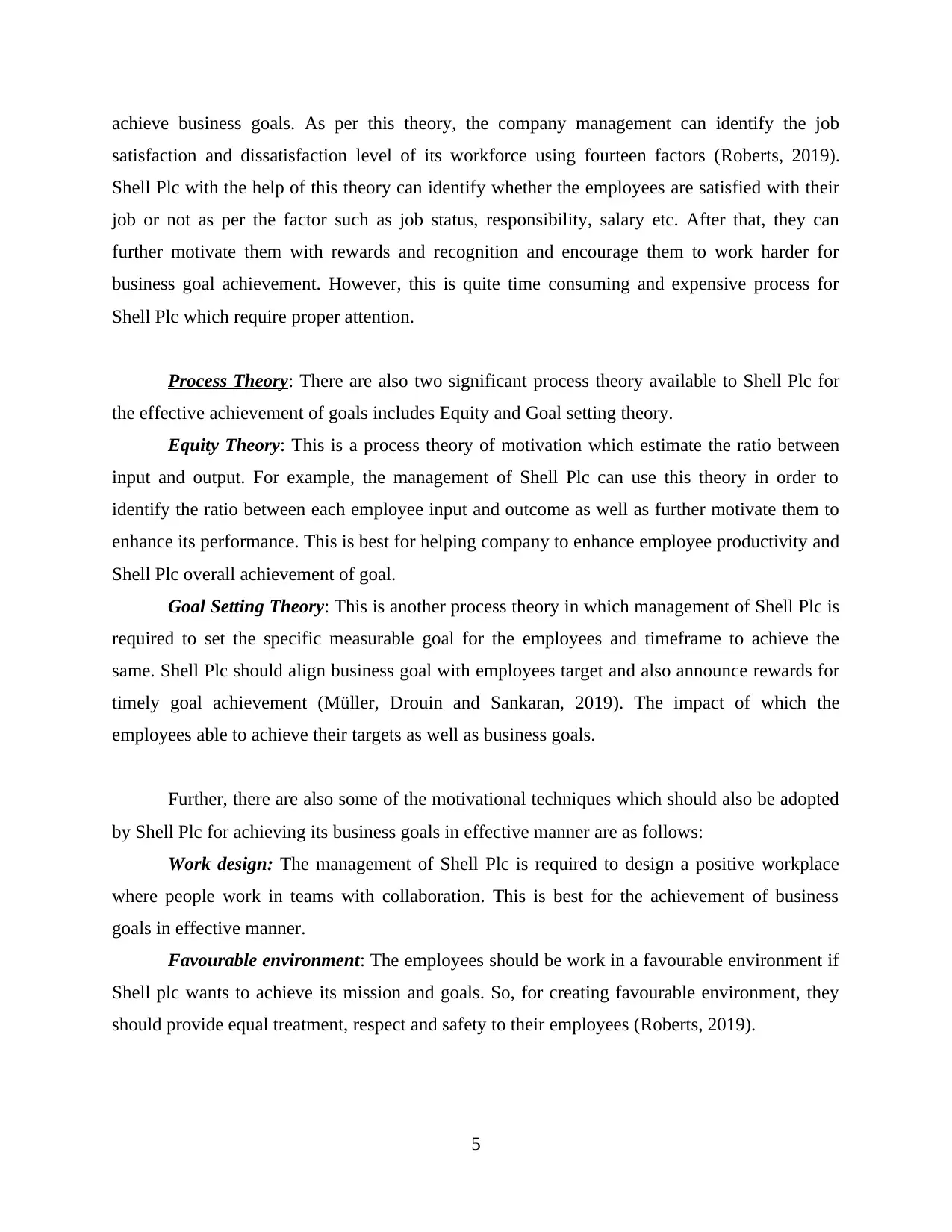
achieve business goals. As per this theory, the company management can identify the job
satisfaction and dissatisfaction level of its workforce using fourteen factors (Roberts, 2019).
Shell Plc with the help of this theory can identify whether the employees are satisfied with their
job or not as per the factor such as job status, responsibility, salary etc. After that, they can
further motivate them with rewards and recognition and encourage them to work harder for
business goal achievement. However, this is quite time consuming and expensive process for
Shell Plc which require proper attention.
Process Theory: There are also two significant process theory available to Shell Plc for
the effective achievement of goals includes Equity and Goal setting theory.
Equity Theory: This is a process theory of motivation which estimate the ratio between
input and output. For example, the management of Shell Plc can use this theory in order to
identify the ratio between each employee input and outcome as well as further motivate them to
enhance its performance. This is best for helping company to enhance employee productivity and
Shell Plc overall achievement of goal.
Goal Setting Theory: This is another process theory in which management of Shell Plc is
required to set the specific measurable goal for the employees and timeframe to achieve the
same. Shell Plc should align business goal with employees target and also announce rewards for
timely goal achievement (Müller, Drouin and Sankaran, 2019). The impact of which the
employees able to achieve their targets as well as business goals.
Further, there are also some of the motivational techniques which should also be adopted
by Shell Plc for achieving its business goals in effective manner are as follows:
Work design: The management of Shell Plc is required to design a positive workplace
where people work in teams with collaboration. This is best for the achievement of business
goals in effective manner.
Favourable environment: The employees should be work in a favourable environment if
Shell plc wants to achieve its mission and goals. So, for creating favourable environment, they
should provide equal treatment, respect and safety to their employees (Roberts, 2019).
5
satisfaction and dissatisfaction level of its workforce using fourteen factors (Roberts, 2019).
Shell Plc with the help of this theory can identify whether the employees are satisfied with their
job or not as per the factor such as job status, responsibility, salary etc. After that, they can
further motivate them with rewards and recognition and encourage them to work harder for
business goal achievement. However, this is quite time consuming and expensive process for
Shell Plc which require proper attention.
Process Theory: There are also two significant process theory available to Shell Plc for
the effective achievement of goals includes Equity and Goal setting theory.
Equity Theory: This is a process theory of motivation which estimate the ratio between
input and output. For example, the management of Shell Plc can use this theory in order to
identify the ratio between each employee input and outcome as well as further motivate them to
enhance its performance. This is best for helping company to enhance employee productivity and
Shell Plc overall achievement of goal.
Goal Setting Theory: This is another process theory in which management of Shell Plc is
required to set the specific measurable goal for the employees and timeframe to achieve the
same. Shell Plc should align business goal with employees target and also announce rewards for
timely goal achievement (Müller, Drouin and Sankaran, 2019). The impact of which the
employees able to achieve their targets as well as business goals.
Further, there are also some of the motivational techniques which should also be adopted
by Shell Plc for achieving its business goals in effective manner are as follows:
Work design: The management of Shell Plc is required to design a positive workplace
where people work in teams with collaboration. This is best for the achievement of business
goals in effective manner.
Favourable environment: The employees should be work in a favourable environment if
Shell plc wants to achieve its mission and goals. So, for creating favourable environment, they
should provide equal treatment, respect and safety to their employees (Roberts, 2019).
5
⊘ This is a preview!⊘
Do you want full access?
Subscribe today to unlock all pages.

Trusted by 1+ million students worldwide
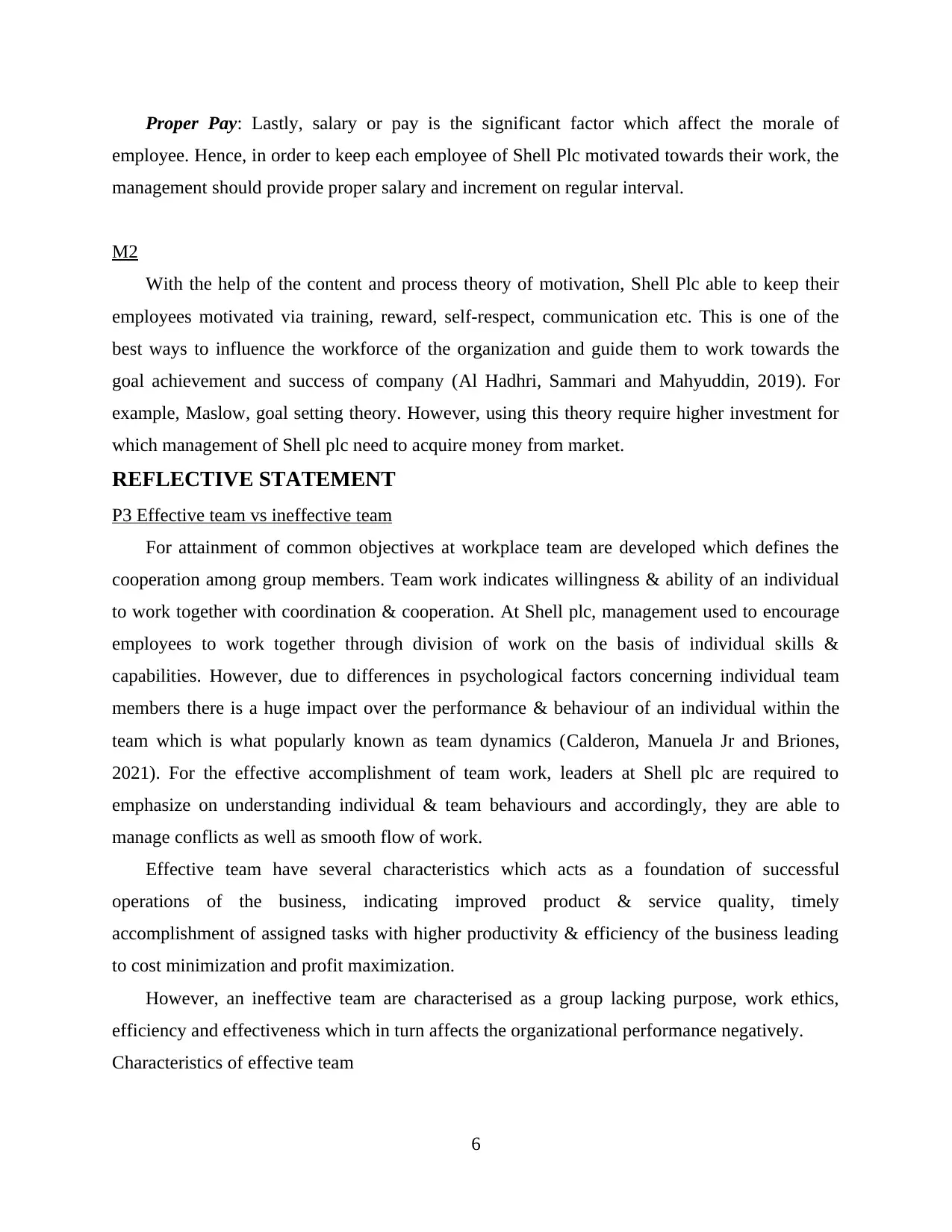
Proper Pay: Lastly, salary or pay is the significant factor which affect the morale of
employee. Hence, in order to keep each employee of Shell Plc motivated towards their work, the
management should provide proper salary and increment on regular interval.
M2
With the help of the content and process theory of motivation, Shell Plc able to keep their
employees motivated via training, reward, self-respect, communication etc. This is one of the
best ways to influence the workforce of the organization and guide them to work towards the
goal achievement and success of company (Al Hadhri, Sammari and Mahyuddin, 2019). For
example, Maslow, goal setting theory. However, using this theory require higher investment for
which management of Shell plc need to acquire money from market.
REFLECTIVE STATEMENT
P3 Effective team vs ineffective team
For attainment of common objectives at workplace team are developed which defines the
cooperation among group members. Team work indicates willingness & ability of an individual
to work together with coordination & cooperation. At Shell plc, management used to encourage
employees to work together through division of work on the basis of individual skills &
capabilities. However, due to differences in psychological factors concerning individual team
members there is a huge impact over the performance & behaviour of an individual within the
team which is what popularly known as team dynamics (Calderon, Manuela Jr and Briones,
2021). For the effective accomplishment of team work, leaders at Shell plc are required to
emphasize on understanding individual & team behaviours and accordingly, they are able to
manage conflicts as well as smooth flow of work.
Effective team have several characteristics which acts as a foundation of successful
operations of the business, indicating improved product & service quality, timely
accomplishment of assigned tasks with higher productivity & efficiency of the business leading
to cost minimization and profit maximization.
However, an ineffective team are characterised as a group lacking purpose, work ethics,
efficiency and effectiveness which in turn affects the organizational performance negatively.
Characteristics of effective team
6
employee. Hence, in order to keep each employee of Shell Plc motivated towards their work, the
management should provide proper salary and increment on regular interval.
M2
With the help of the content and process theory of motivation, Shell Plc able to keep their
employees motivated via training, reward, self-respect, communication etc. This is one of the
best ways to influence the workforce of the organization and guide them to work towards the
goal achievement and success of company (Al Hadhri, Sammari and Mahyuddin, 2019). For
example, Maslow, goal setting theory. However, using this theory require higher investment for
which management of Shell plc need to acquire money from market.
REFLECTIVE STATEMENT
P3 Effective team vs ineffective team
For attainment of common objectives at workplace team are developed which defines the
cooperation among group members. Team work indicates willingness & ability of an individual
to work together with coordination & cooperation. At Shell plc, management used to encourage
employees to work together through division of work on the basis of individual skills &
capabilities. However, due to differences in psychological factors concerning individual team
members there is a huge impact over the performance & behaviour of an individual within the
team which is what popularly known as team dynamics (Calderon, Manuela Jr and Briones,
2021). For the effective accomplishment of team work, leaders at Shell plc are required to
emphasize on understanding individual & team behaviours and accordingly, they are able to
manage conflicts as well as smooth flow of work.
Effective team have several characteristics which acts as a foundation of successful
operations of the business, indicating improved product & service quality, timely
accomplishment of assigned tasks with higher productivity & efficiency of the business leading
to cost minimization and profit maximization.
However, an ineffective team are characterised as a group lacking purpose, work ethics,
efficiency and effectiveness which in turn affects the organizational performance negatively.
Characteristics of effective team
6
Paraphrase This Document
Need a fresh take? Get an instant paraphrase of this document with our AI Paraphraser
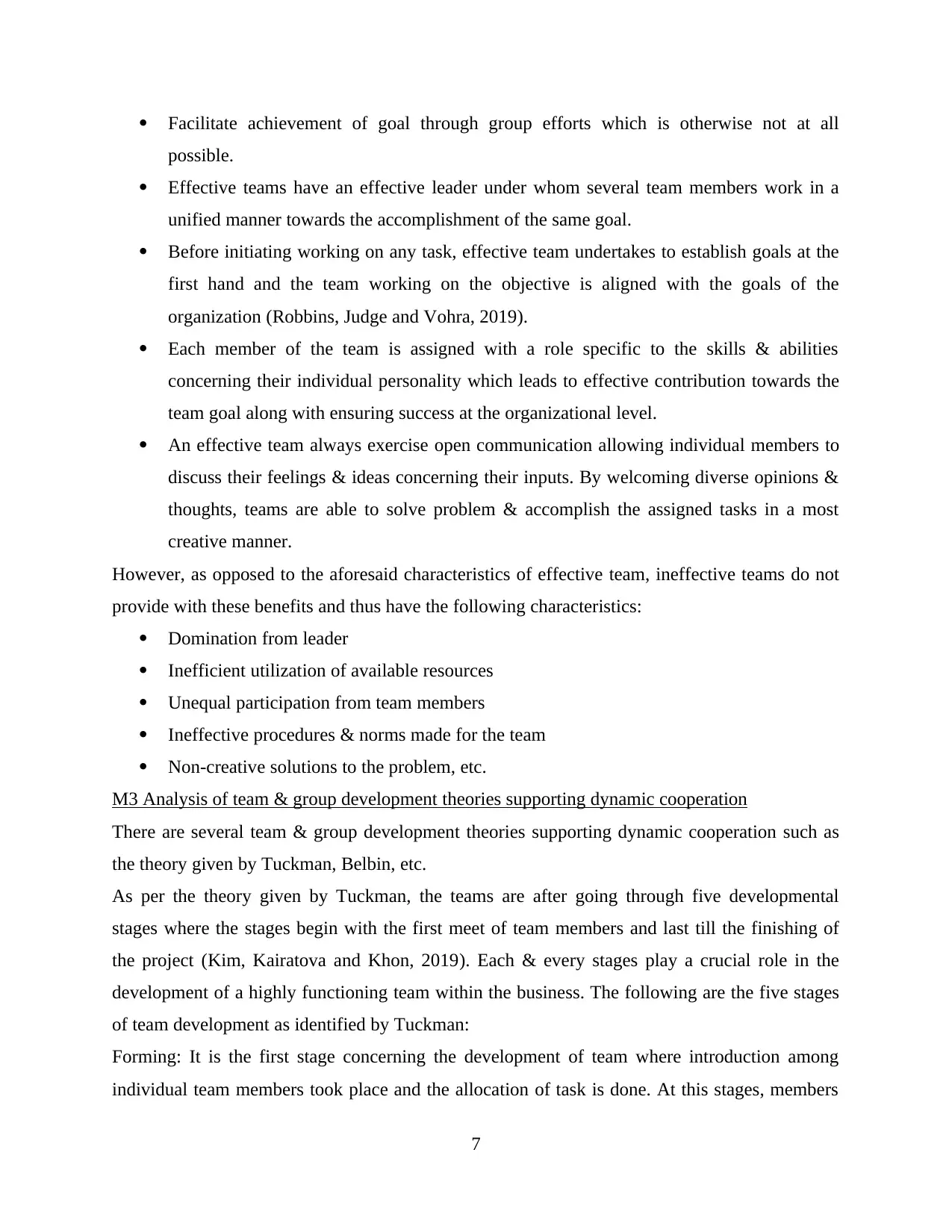
Facilitate achievement of goal through group efforts which is otherwise not at all
possible.
Effective teams have an effective leader under whom several team members work in a
unified manner towards the accomplishment of the same goal.
Before initiating working on any task, effective team undertakes to establish goals at the
first hand and the team working on the objective is aligned with the goals of the
organization (Robbins, Judge and Vohra, 2019).
Each member of the team is assigned with a role specific to the skills & abilities
concerning their individual personality which leads to effective contribution towards the
team goal along with ensuring success at the organizational level.
An effective team always exercise open communication allowing individual members to
discuss their feelings & ideas concerning their inputs. By welcoming diverse opinions &
thoughts, teams are able to solve problem & accomplish the assigned tasks in a most
creative manner.
However, as opposed to the aforesaid characteristics of effective team, ineffective teams do not
provide with these benefits and thus have the following characteristics:
Domination from leader
Inefficient utilization of available resources
Unequal participation from team members
Ineffective procedures & norms made for the team
Non-creative solutions to the problem, etc.
M3 Analysis of team & group development theories supporting dynamic cooperation
There are several team & group development theories supporting dynamic cooperation such as
the theory given by Tuckman, Belbin, etc.
As per the theory given by Tuckman, the teams are after going through five developmental
stages where the stages begin with the first meet of team members and last till the finishing of
the project (Kim, Kairatova and Khon, 2019). Each & every stages play a crucial role in the
development of a highly functioning team within the business. The following are the five stages
of team development as identified by Tuckman:
Forming: It is the first stage concerning the development of team where introduction among
individual team members took place and the allocation of task is done. At this stages, members
7
possible.
Effective teams have an effective leader under whom several team members work in a
unified manner towards the accomplishment of the same goal.
Before initiating working on any task, effective team undertakes to establish goals at the
first hand and the team working on the objective is aligned with the goals of the
organization (Robbins, Judge and Vohra, 2019).
Each member of the team is assigned with a role specific to the skills & abilities
concerning their individual personality which leads to effective contribution towards the
team goal along with ensuring success at the organizational level.
An effective team always exercise open communication allowing individual members to
discuss their feelings & ideas concerning their inputs. By welcoming diverse opinions &
thoughts, teams are able to solve problem & accomplish the assigned tasks in a most
creative manner.
However, as opposed to the aforesaid characteristics of effective team, ineffective teams do not
provide with these benefits and thus have the following characteristics:
Domination from leader
Inefficient utilization of available resources
Unequal participation from team members
Ineffective procedures & norms made for the team
Non-creative solutions to the problem, etc.
M3 Analysis of team & group development theories supporting dynamic cooperation
There are several team & group development theories supporting dynamic cooperation such as
the theory given by Tuckman, Belbin, etc.
As per the theory given by Tuckman, the teams are after going through five developmental
stages where the stages begin with the first meet of team members and last till the finishing of
the project (Kim, Kairatova and Khon, 2019). Each & every stages play a crucial role in the
development of a highly functioning team within the business. The following are the five stages
of team development as identified by Tuckman:
Forming: It is the first stage concerning the development of team where introduction among
individual team members took place and the allocation of task is done. At this stages, members
7
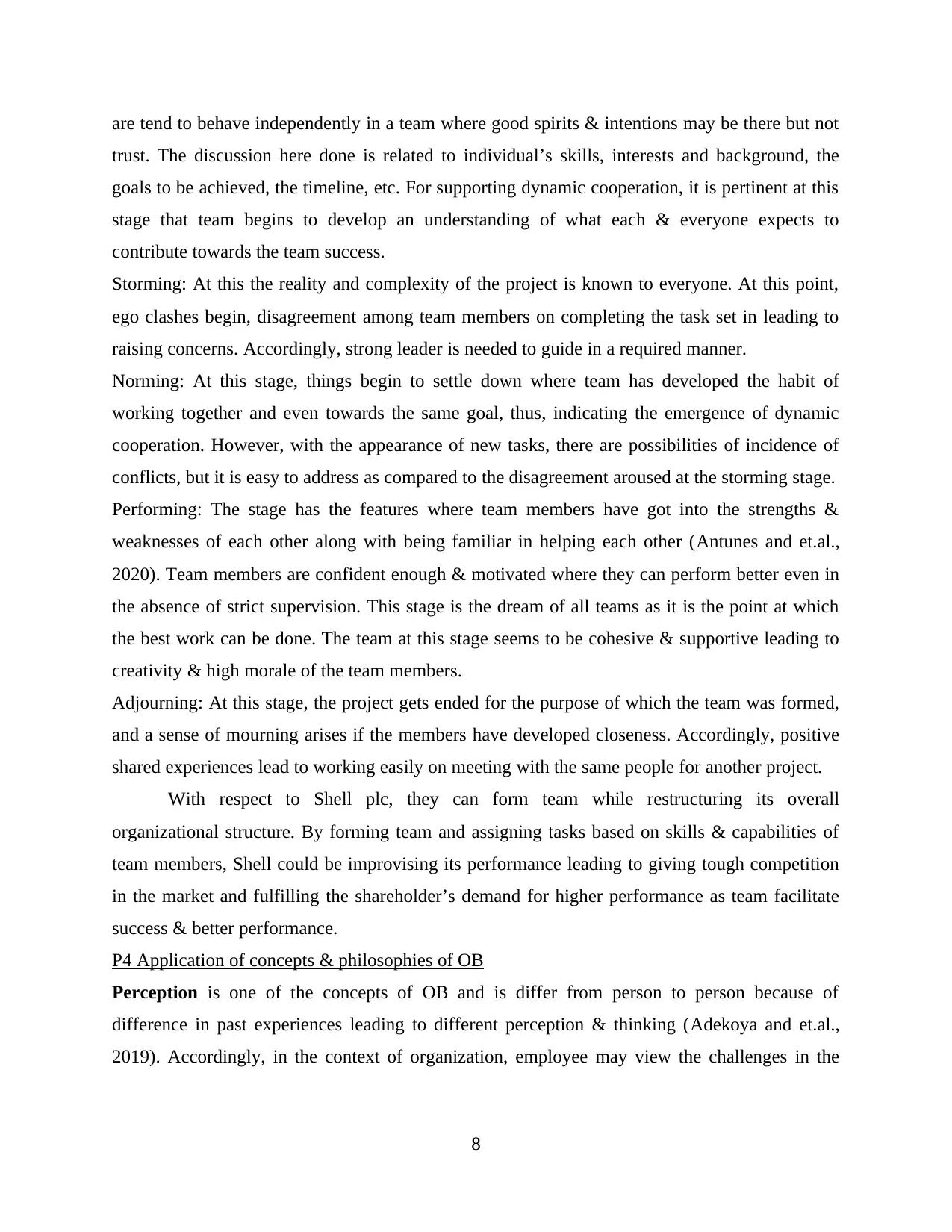
are tend to behave independently in a team where good spirits & intentions may be there but not
trust. The discussion here done is related to individual’s skills, interests and background, the
goals to be achieved, the timeline, etc. For supporting dynamic cooperation, it is pertinent at this
stage that team begins to develop an understanding of what each & everyone expects to
contribute towards the team success.
Storming: At this the reality and complexity of the project is known to everyone. At this point,
ego clashes begin, disagreement among team members on completing the task set in leading to
raising concerns. Accordingly, strong leader is needed to guide in a required manner.
Norming: At this stage, things begin to settle down where team has developed the habit of
working together and even towards the same goal, thus, indicating the emergence of dynamic
cooperation. However, with the appearance of new tasks, there are possibilities of incidence of
conflicts, but it is easy to address as compared to the disagreement aroused at the storming stage.
Performing: The stage has the features where team members have got into the strengths &
weaknesses of each other along with being familiar in helping each other (Antunes and et.al.,
2020). Team members are confident enough & motivated where they can perform better even in
the absence of strict supervision. This stage is the dream of all teams as it is the point at which
the best work can be done. The team at this stage seems to be cohesive & supportive leading to
creativity & high morale of the team members.
Adjourning: At this stage, the project gets ended for the purpose of which the team was formed,
and a sense of mourning arises if the members have developed closeness. Accordingly, positive
shared experiences lead to working easily on meeting with the same people for another project.
With respect to Shell plc, they can form team while restructuring its overall
organizational structure. By forming team and assigning tasks based on skills & capabilities of
team members, Shell could be improvising its performance leading to giving tough competition
in the market and fulfilling the shareholder’s demand for higher performance as team facilitate
success & better performance.
P4 Application of concepts & philosophies of OB
Perception is one of the concepts of OB and is differ from person to person because of
difference in past experiences leading to different perception & thinking (Adekoya and et.al.,
2019). Accordingly, in the context of organization, employee may view the challenges in the
8
trust. The discussion here done is related to individual’s skills, interests and background, the
goals to be achieved, the timeline, etc. For supporting dynamic cooperation, it is pertinent at this
stage that team begins to develop an understanding of what each & everyone expects to
contribute towards the team success.
Storming: At this the reality and complexity of the project is known to everyone. At this point,
ego clashes begin, disagreement among team members on completing the task set in leading to
raising concerns. Accordingly, strong leader is needed to guide in a required manner.
Norming: At this stage, things begin to settle down where team has developed the habit of
working together and even towards the same goal, thus, indicating the emergence of dynamic
cooperation. However, with the appearance of new tasks, there are possibilities of incidence of
conflicts, but it is easy to address as compared to the disagreement aroused at the storming stage.
Performing: The stage has the features where team members have got into the strengths &
weaknesses of each other along with being familiar in helping each other (Antunes and et.al.,
2020). Team members are confident enough & motivated where they can perform better even in
the absence of strict supervision. This stage is the dream of all teams as it is the point at which
the best work can be done. The team at this stage seems to be cohesive & supportive leading to
creativity & high morale of the team members.
Adjourning: At this stage, the project gets ended for the purpose of which the team was formed,
and a sense of mourning arises if the members have developed closeness. Accordingly, positive
shared experiences lead to working easily on meeting with the same people for another project.
With respect to Shell plc, they can form team while restructuring its overall
organizational structure. By forming team and assigning tasks based on skills & capabilities of
team members, Shell could be improvising its performance leading to giving tough competition
in the market and fulfilling the shareholder’s demand for higher performance as team facilitate
success & better performance.
P4 Application of concepts & philosophies of OB
Perception is one of the concepts of OB and is differ from person to person because of
difference in past experiences leading to different perception & thinking (Adekoya and et.al.,
2019). Accordingly, in the context of organization, employee may view the challenges in the
8
⊘ This is a preview!⊘
Do you want full access?
Subscribe today to unlock all pages.

Trusted by 1+ million students worldwide
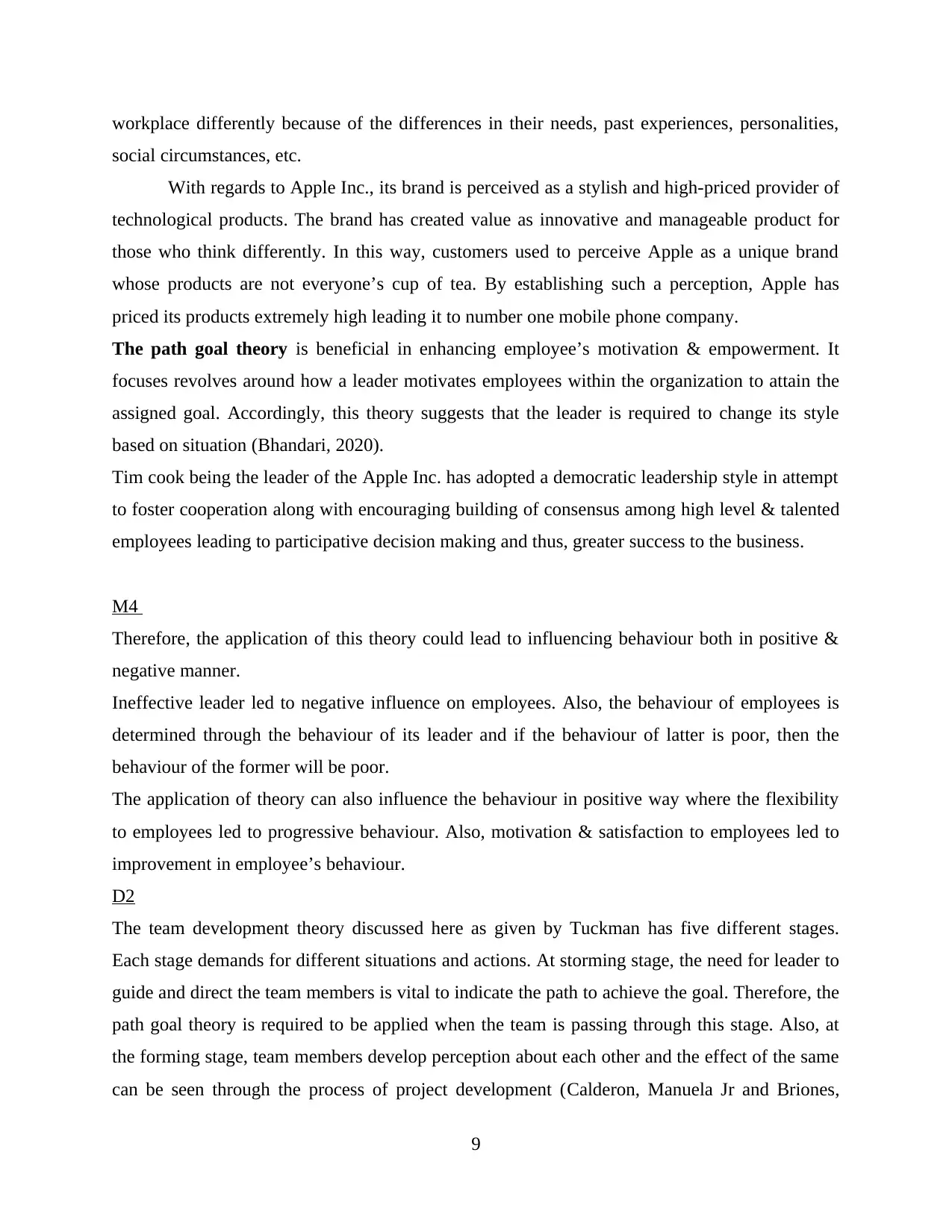
workplace differently because of the differences in their needs, past experiences, personalities,
social circumstances, etc.
With regards to Apple Inc., its brand is perceived as a stylish and high-priced provider of
technological products. The brand has created value as innovative and manageable product for
those who think differently. In this way, customers used to perceive Apple as a unique brand
whose products are not everyone’s cup of tea. By establishing such a perception, Apple has
priced its products extremely high leading it to number one mobile phone company.
The path goal theory is beneficial in enhancing employee’s motivation & empowerment. It
focuses revolves around how a leader motivates employees within the organization to attain the
assigned goal. Accordingly, this theory suggests that the leader is required to change its style
based on situation (Bhandari, 2020).
Tim cook being the leader of the Apple Inc. has adopted a democratic leadership style in attempt
to foster cooperation along with encouraging building of consensus among high level & talented
employees leading to participative decision making and thus, greater success to the business.
M4
Therefore, the application of this theory could lead to influencing behaviour both in positive &
negative manner.
Ineffective leader led to negative influence on employees. Also, the behaviour of employees is
determined through the behaviour of its leader and if the behaviour of latter is poor, then the
behaviour of the former will be poor.
The application of theory can also influence the behaviour in positive way where the flexibility
to employees led to progressive behaviour. Also, motivation & satisfaction to employees led to
improvement in employee’s behaviour.
D2
The team development theory discussed here as given by Tuckman has five different stages.
Each stage demands for different situations and actions. At storming stage, the need for leader to
guide and direct the team members is vital to indicate the path to achieve the goal. Therefore, the
path goal theory is required to be applied when the team is passing through this stage. Also, at
the forming stage, team members develop perception about each other and the effect of the same
can be seen through the process of project development (Calderon, Manuela Jr and Briones,
9
social circumstances, etc.
With regards to Apple Inc., its brand is perceived as a stylish and high-priced provider of
technological products. The brand has created value as innovative and manageable product for
those who think differently. In this way, customers used to perceive Apple as a unique brand
whose products are not everyone’s cup of tea. By establishing such a perception, Apple has
priced its products extremely high leading it to number one mobile phone company.
The path goal theory is beneficial in enhancing employee’s motivation & empowerment. It
focuses revolves around how a leader motivates employees within the organization to attain the
assigned goal. Accordingly, this theory suggests that the leader is required to change its style
based on situation (Bhandari, 2020).
Tim cook being the leader of the Apple Inc. has adopted a democratic leadership style in attempt
to foster cooperation along with encouraging building of consensus among high level & talented
employees leading to participative decision making and thus, greater success to the business.
M4
Therefore, the application of this theory could lead to influencing behaviour both in positive &
negative manner.
Ineffective leader led to negative influence on employees. Also, the behaviour of employees is
determined through the behaviour of its leader and if the behaviour of latter is poor, then the
behaviour of the former will be poor.
The application of theory can also influence the behaviour in positive way where the flexibility
to employees led to progressive behaviour. Also, motivation & satisfaction to employees led to
improvement in employee’s behaviour.
D2
The team development theory discussed here as given by Tuckman has five different stages.
Each stage demands for different situations and actions. At storming stage, the need for leader to
guide and direct the team members is vital to indicate the path to achieve the goal. Therefore, the
path goal theory is required to be applied when the team is passing through this stage. Also, at
the forming stage, team members develop perception about each other and the effect of the same
can be seen through the process of project development (Calderon, Manuela Jr and Briones,
9
Paraphrase This Document
Need a fresh take? Get an instant paraphrase of this document with our AI Paraphraser

2021). This is because, if a team member notice something bad about other team member, then it
would lead to disagreement among team members and in turn, attainment of team goal would
become impossible. Also, if each & everyone have positive outlook towards each other, then it
would support dynamic cooperation and attainment of team goal both effectively & efficiently.
CONCLUSION
After summing up the above information, it has been concluded that organization culture,
politics and power can influence individual and teams of Shell Plc. Further, the report has
concluded that Shell plc should adopt content theory such as Maslow and process theory such as
goal setting in order to motivate employee and effectively achieve organizational objectives. The
report has further concluded the difference between effective and ineffective team as well as the
philosophies of organization behaviour as a part of reflective statement. The report has further
concluded the application of philosophies and concepts of organization behaviour such as
perception and path goal theory with the help of which the employees of Shell Plc able to
achieve its target. It is also concluded from the report that Shell Plc should align the company
goal with the employee’s goal in order to achieve it more easily and quickly. In order to achieve
the target, the management of Shell Plc should build positive workplace environment.
10
would lead to disagreement among team members and in turn, attainment of team goal would
become impossible. Also, if each & everyone have positive outlook towards each other, then it
would support dynamic cooperation and attainment of team goal both effectively & efficiently.
CONCLUSION
After summing up the above information, it has been concluded that organization culture,
politics and power can influence individual and teams of Shell Plc. Further, the report has
concluded that Shell plc should adopt content theory such as Maslow and process theory such as
goal setting in order to motivate employee and effectively achieve organizational objectives. The
report has further concluded the difference between effective and ineffective team as well as the
philosophies of organization behaviour as a part of reflective statement. The report has further
concluded the application of philosophies and concepts of organization behaviour such as
perception and path goal theory with the help of which the employees of Shell Plc able to
achieve its target. It is also concluded from the report that Shell Plc should align the company
goal with the employee’s goal in order to achieve it more easily and quickly. In order to achieve
the target, the management of Shell Plc should build positive workplace environment.
10
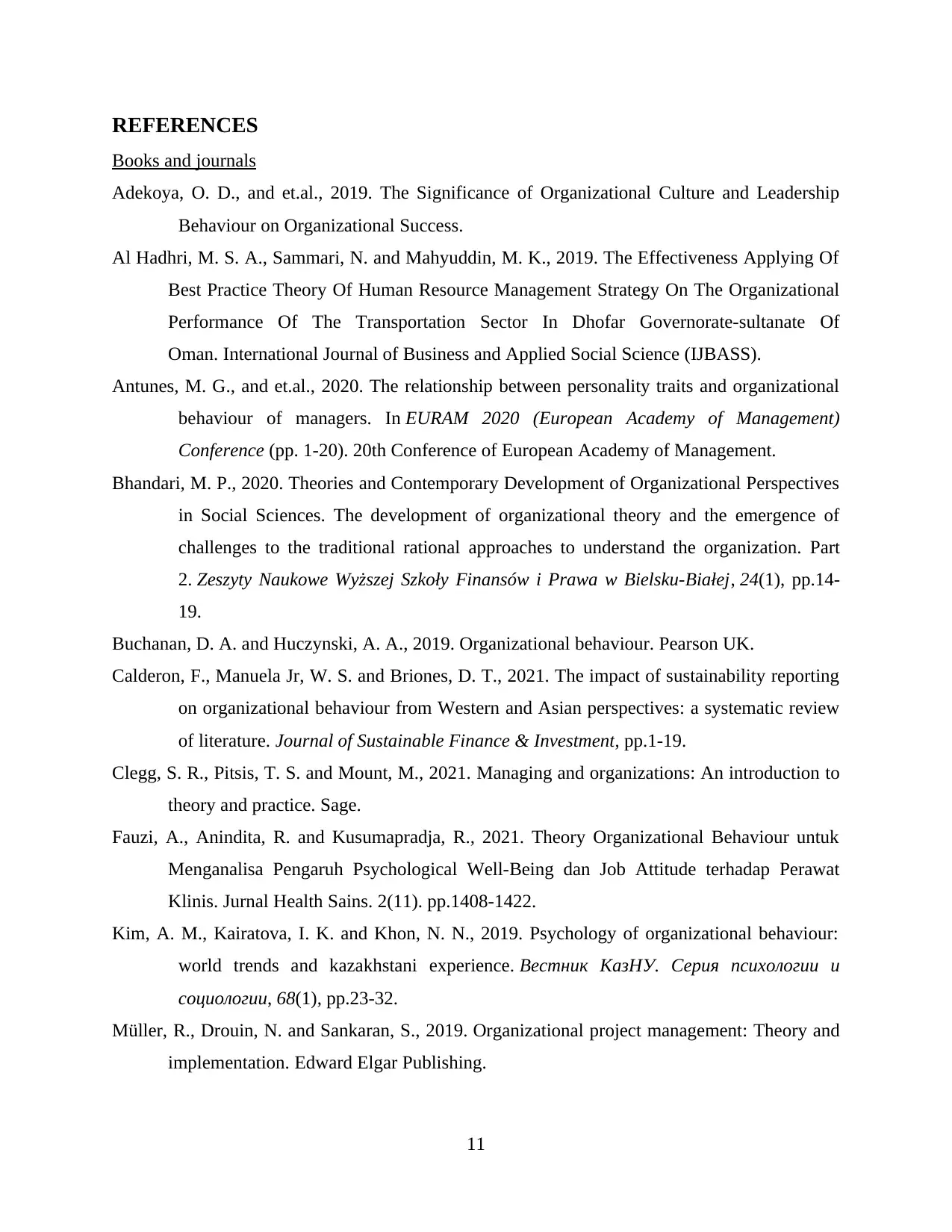
REFERENCES
Books and journals
Adekoya, O. D., and et.al., 2019. The Significance of Organizational Culture and Leadership
Behaviour on Organizational Success.
Al Hadhri, M. S. A., Sammari, N. and Mahyuddin, M. K., 2019. The Effectiveness Applying Of
Best Practice Theory Of Human Resource Management Strategy On The Organizational
Performance Of The Transportation Sector In Dhofar Governorate-sultanate Of
Oman. International Journal of Business and Applied Social Science (IJBASS).
Antunes, M. G., and et.al., 2020. The relationship between personality traits and organizational
behaviour of managers. In EURAM 2020 (European Academy of Management)
Conference (pp. 1-20). 20th Conference of European Academy of Management.
Bhandari, M. P., 2020. Theories and Contemporary Development of Organizational Perspectives
in Social Sciences. The development of organizational theory and the emergence of
challenges to the traditional rational approaches to understand the organization. Part
2. Zeszyty Naukowe Wyższej Szkoły Finansów i Prawa w Bielsku-Białej, 24(1), pp.14-
19.
Buchanan, D. A. and Huczynski, A. A., 2019. Organizational behaviour. Pearson UK.
Calderon, F., Manuela Jr, W. S. and Briones, D. T., 2021. The impact of sustainability reporting
on organizational behaviour from Western and Asian perspectives: a systematic review
of literature. Journal of Sustainable Finance & Investment, pp.1-19.
Clegg, S. R., Pitsis, T. S. and Mount, M., 2021. Managing and organizations: An introduction to
theory and practice. Sage.
Fauzi, A., Anindita, R. and Kusumapradja, R., 2021. Theory Organizational Behaviour untuk
Menganalisa Pengaruh Psychological Well-Being dan Job Attitude terhadap Perawat
Klinis. Jurnal Health Sains. 2(11). pp.1408-1422.
Kim, A. M., Kairatova, I. K. and Khon, N. N., 2019. Psychology of organizational behaviour:
world trends and kazakhstani experience. Вестник КазНУ. Серия психологии и
социологии, 68(1), pp.23-32.
Müller, R., Drouin, N. and Sankaran, S., 2019. Organizational project management: Theory and
implementation. Edward Elgar Publishing.
11
Books and journals
Adekoya, O. D., and et.al., 2019. The Significance of Organizational Culture and Leadership
Behaviour on Organizational Success.
Al Hadhri, M. S. A., Sammari, N. and Mahyuddin, M. K., 2019. The Effectiveness Applying Of
Best Practice Theory Of Human Resource Management Strategy On The Organizational
Performance Of The Transportation Sector In Dhofar Governorate-sultanate Of
Oman. International Journal of Business and Applied Social Science (IJBASS).
Antunes, M. G., and et.al., 2020. The relationship between personality traits and organizational
behaviour of managers. In EURAM 2020 (European Academy of Management)
Conference (pp. 1-20). 20th Conference of European Academy of Management.
Bhandari, M. P., 2020. Theories and Contemporary Development of Organizational Perspectives
in Social Sciences. The development of organizational theory and the emergence of
challenges to the traditional rational approaches to understand the organization. Part
2. Zeszyty Naukowe Wyższej Szkoły Finansów i Prawa w Bielsku-Białej, 24(1), pp.14-
19.
Buchanan, D. A. and Huczynski, A. A., 2019. Organizational behaviour. Pearson UK.
Calderon, F., Manuela Jr, W. S. and Briones, D. T., 2021. The impact of sustainability reporting
on organizational behaviour from Western and Asian perspectives: a systematic review
of literature. Journal of Sustainable Finance & Investment, pp.1-19.
Clegg, S. R., Pitsis, T. S. and Mount, M., 2021. Managing and organizations: An introduction to
theory and practice. Sage.
Fauzi, A., Anindita, R. and Kusumapradja, R., 2021. Theory Organizational Behaviour untuk
Menganalisa Pengaruh Psychological Well-Being dan Job Attitude terhadap Perawat
Klinis. Jurnal Health Sains. 2(11). pp.1408-1422.
Kim, A. M., Kairatova, I. K. and Khon, N. N., 2019. Psychology of organizational behaviour:
world trends and kazakhstani experience. Вестник КазНУ. Серия психологии и
социологии, 68(1), pp.23-32.
Müller, R., Drouin, N. and Sankaran, S., 2019. Organizational project management: Theory and
implementation. Edward Elgar Publishing.
11
⊘ This is a preview!⊘
Do you want full access?
Subscribe today to unlock all pages.

Trusted by 1+ million students worldwide
1 out of 13
Related Documents
Your All-in-One AI-Powered Toolkit for Academic Success.
+13062052269
info@desklib.com
Available 24*7 on WhatsApp / Email
![[object Object]](/_next/static/media/star-bottom.7253800d.svg)
Unlock your academic potential
Copyright © 2020–2026 A2Z Services. All Rights Reserved. Developed and managed by ZUCOL.





